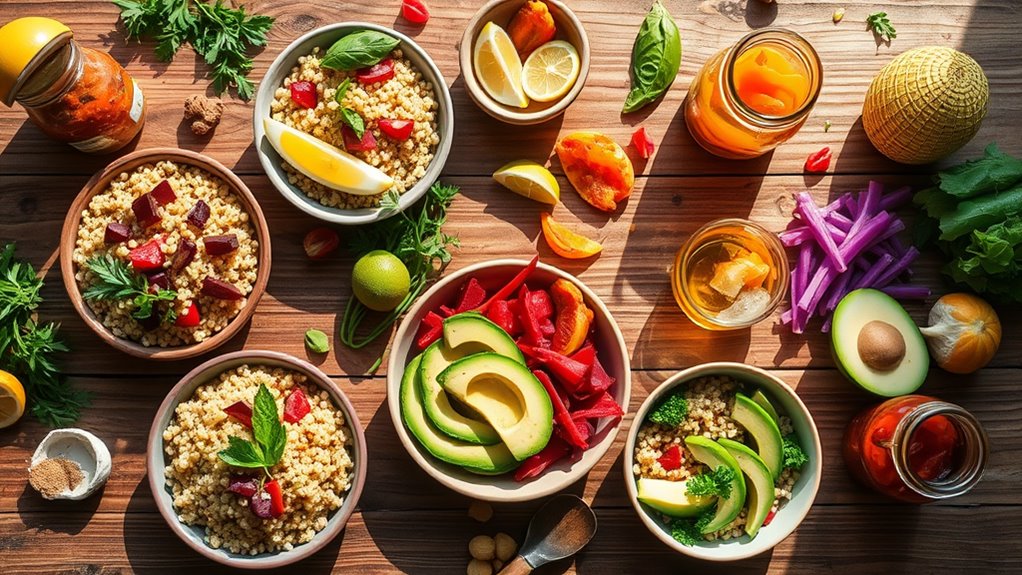Everyone’s Obsessed With Gut-Healthy Meals-Should You Be Too.
You’ve probably noticed the rising trend of gut-healthy meals and wondered if you should jump on the bandwagon. The connection between gut health and your immune system is well-established, and the potential benefits extend beyond digestion. From enhanced mood to increased energy levels, the impact of what you eat is significant. But how do you know if focusing on gut health is right for you? Let’s explore the essentials and find out if this could be a game-changer for your well-being.
Understanding Gut Health and Its Importance
How does gut health impact your overall well-being?
Your gut plays a crucial role in digestion, nutrient absorption, and immune function. When it’s balanced, you may experience improved mood, energy levels, and weight management. A healthy gut microbiome can also reduce inflammation and support mental health. Incorporating gut-healthy meals, rich in fiber, probiotics, and prebiotics, can promote this balance. Foods like yogurt, fermented vegetables, and whole grains nourish beneficial bacteria, enhancing digestive efficiency. Additionally, gut-healthy meals can help prevent chronic diseases and support long-term health. Understanding gut health’s significance empowers you to make informed dietary choices, ultimately leading to a healthier lifestyle and better overall well-being.
Key Benefits of Eating Gut-Healthy Meals
Eating gut-healthy meals not only supports your digestive system but also offers a range of benefits that can enhance your overall health.
Improved gut health can boost your immune system, making you less susceptible to illnesses. Additionally, a balanced gut microbiome may improve your mood and mental health, as gut bacteria produce neurotransmitters like serotonin.
You might also experience increased energy levels, better nutrient absorption, and reduced inflammation. Moreover, gut-friendly foods can help regulate weight by promoting feelings of fullness, aiding in weight management. Incorporating fermented foods into your diet can further enhance these gut health benefits.
Ultimately, embracing these meals can lead to a healthier, happier you.
Popular Ingredients for a Gut-Friendly Diet
A diverse array of ingredients can transform your meals into gut-friendly powerhouses.
Start with fermented foods like yogurt, kimchi, and sauerkraut, which are rich in probiotics that support a healthy microbiome.
Include fiber-rich foods such as whole grains, legumes, and fruits to promote regular digestion.
Don’t forget prebiotic foods like garlic, onions, and bananas, which feed your beneficial gut bacteria.
Healthy fats from avocados, nuts, and olive oil can also play a role in reducing inflammation. Incorporating gut-friendly foods into your diet not only enhances digestion but also boosts overall health.
How Gut Health Affects Your Overall Well-Being
Your gut health plays a crucial role in your overall well-being, influencing everything from your immune system to your mental health.
A balanced gut can enhance digestive function, helping your body absorb nutrients more effectively.
Incorporating gut-healthy recipes into your diet can provide the necessary support for maintaining a thriving digestive system.
Understanding this connection can empower you to make healthier dietary choices for a more vibrant life.
Immune System Connection
How does gut health influence your immune system?
Your gut is home to trillions of bacteria, collectively known as the gut microbiome, which plays a crucial role in your immune response.
A balanced microbiome helps your body distinguish between harmful pathogens and beneficial microbes, reducing inflammation and enhancing immune function.
Research shows that a diverse gut microbiome can lead to a stronger immune system, decreasing the risk of infections and autoimmune diseases.
Mental Health Impact
The connection between gut health and mental well-being has gained significant attention in recent years.
Research shows that your gut microbiome can influence mood, anxiety, and overall mental health.
Here are four key points to consider:
-
Gut-Brain Axis: The gut and brain communicate constantly, affecting emotions and stress responses.
-
Neurotransmitter Production: Gut bacteria produce essential neurotransmitters like serotonin, crucial for mood regulation.
-
Inflammation: An unhealthy gut can lead to systemic inflammation, linked to depression and anxiety.
-
Dietary Impact: Consuming fiber-rich and fermented foods can enhance gut health, positively influencing your mental state.
Digestive Function Importance
What role does digestive function play in your overall well-being?
Your gut is crucial for breaking down food, absorbing nutrients, and eliminating waste.
A healthy digestive system supports immune function, as about 70% of your immune cells reside in the gut.
When your digestion falters, you may experience symptoms like bloating or fatigue, which can affect your daily life.
Moreover, emerging research links gut health to mental well-being, highlighting the gut-brain connection.
By prioritizing gut health through balanced meals and probiotics, you can enhance not just digestion but your overall physical and mental wellness.
It’s more interconnected than you might think.
Easy Recipes to Try at Home
Trying out gut-healthy meals at home can be both enjoyable and rewarding. Here are four easy recipes you can try:
Exploring gut-healthy meals at home is a fun and fulfilling way to nourish your body.
-
Yogurt Parfait: Layer plain Greek yogurt with fresh fruits and a sprinkle of granola for a delicious breakfast.
-
Quinoa Salad: Mix cooked quinoa with chopped vegetables, olive oil, and lemon juice for a light lunch.
-
Fermented Veggies: Try making sauerkraut or kimchi to boost your probiotic intake, as these foods are known for their health benefits and cultural significance.
-
Bone Broth Soup: Simmer bones with herbs and vegetables for a nutrient-rich, gut-soothing meal.
These simple recipes can enhance your gut health while being easy to prepare.
Tips for Incorporating Gut-Healthy Foods Into Your Daily Routine
Incorporating gut-healthy foods into your daily routine can be simpler than you might think, especially when you make small, intentional changes.
Start by adding fermented foods like yogurt or sauerkraut to your meals, as they contain beneficial probiotics. Swap refined grains for whole grains like quinoa or brown rice, which support digestive health. Snack on fiber-rich fruits and vegetables to promote regularity. Consider blending a smoothie with spinach, bananas, and kefir for breakfast. Including probiotic snacks can also enhance your gut health further, making it easier to meet your daily needs.
Lastly, stay hydrated—water aids digestion. By gradually integrating these foods, you’ll nourish your gut and potentially improve overall well-being without overwhelming yourself.
Listening to Your Body: Signs You Need to Focus on Gut Health
Have you noticed changes in your digestion or overall wellness?
If so, it might be time to focus on your gut health.
Here are some signs to watch for:
-
Bloating or Gas: Frequent discomfort after eating can indicate digestive issues.
-
Irregular Bowel Movements: Consistent constipation or diarrhea may signal an imbalanced gut.
-
Food Intolerances: New sensitivities to foods you previously enjoyed can point to gut problems.
-
Fatigue or Mood Swings: Gut health is linked to energy levels and emotional well-being. Incorporating gut-friendly foods into your morning routine can enhance digestion and support overall wellness.
Listening to your body can help you prioritize gut health and improve your overall wellness.

